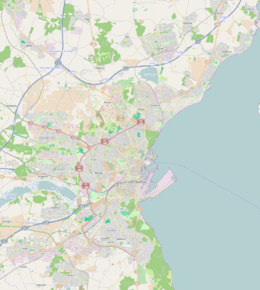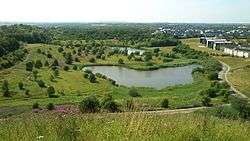Gellerup
| Gellerup | |
|---|---|
| Neighborhood | |
|
The Gellerup Parken urban development project | |
 Gellerup Location of Gellerup in Aarhus | |
| Coordinates: DK 56°09′26″N 10°08′07″E / 56.157267°N 10.135157°E | |
| Country | Kingdom of Denmark |
| Regions of Denmark | Central Denmark Region |
| Municipality | Aarhus Municipality |
| District | Brabrand |
| Population (2012)[1] | |
| • Total | 11,406 |
| Postal code | 8200 Brabrand |
Gellerup is a neighborhood of the Brabrand district in the city of Aarhus, Denmark. The neighborhood was formerly a suburb that has now completely merged with the city and it is characterized by several natural attractions, detached house sectors, highrise apartments and an industrial park.
The name Gellerup is also commonly used to refer to the large residential area and housing project of the Gellerup Plan (Danish: Gellerup Planen) located within the neighborhood and comprising several residential areas including Toveshøj and the Gellerup park (Danish: Gellerupparken). The project houses people from many places in the world.
The Gellerup Plan
History
To address housing problems that suddenly emerged in the late 1960s, Brabrand Housing Cooperative initiated and financed the Gellerup Plan. It was designed by architects Knud Blach Petersen and Mogens Harbo, who were influenced by the functionalistic ideas of Le Corbusier. The Gellerup Plan was constructed between 1968 and 1972, and contains a total of 2,448 apartments in two neighbouring sectors, Gellerupparken and Toveshøj, with 1,824 and 624 apartments respectively.[2][3]
Even though the buildings are characterized by high rise concrete apartments, constructed from the usual large prefabricated concrete slabs, the project has a unique architectural value. The Gellerup Plan is the largest housing project in Denmark, with approximately 8,000 residents, but was originally planned to house more than twice as many people in 6,000 apartments.[4]
The Gellerup Plan and its facilities, was all built as an architectural and functional unit, that at the same time makes it work as a self-supporting satellite city. This includes schools, kindergartens, sports facilities, a local waste incineration plant supplying central heating, a church, a library and a large mall that originally offered a post office, bank, dentist, doctors, general and grocery stores, supermarkets, restaurants, cafés, hairdressing saloons and a cinema among other stores and facilities. All these stores and structures were originally owned and administered democratically by the residents themselves through the Brabrand Housing Cooperative, based on a socialist idea. This ownership and administrative structure has changed somewhat since these early years, for various reasons, but the architectural aspects remains.
The individual apartments of the Gellerup Plan were large, with open space between the blocks. They came equipped with bathrooms (some have two) and central heating (hot water circulation), where the energy is generated from the local waste incineration plant, collecting the daily waste through a special tube system, reaching every apartment. This was considered very luxurious for the vast majority of Aarhus citizens in the early 1960s.[5]
Shopping

The mall now known as City Vest, was originally designed by the architectural firm of Tougård and the engineering company Nieport & Co. In its early days, the mall was named Gellerup Center and the buildings stood finished in 1972. A two story building, with 45,000 m2 of floor space, it was at the time the largest mall in Denmark, and was owned in part by the Brabrand Housing Cooperative. It is now the third largest. Gellerup Center made great profits initially, but some of it was invested unwisely, and other communally owned elements of the housing projects (such as the swimming hall) were less successful. Eventually the cooperative sold their shares, and the Gellerup Center went bankrupt in 1976. The insurance company Baltica bought the Gellerup Center for kr 125.7 million, and redeveloped the building in 1980. The mall's name was changed to City Vest. Today City Vest is owned by Danica Pension and managed by Norwegian-based shopping centre company Steen & Strøm.[6][7]
Bazar Vest is a bazaar in the northern part of The Gellerup Plan, owned and developed by Danish building company Olav de Linde with shops, rented mostly by immigrants. The bazar has won the 'Erhvervslivets Ridderkors' prize for their efforts and successes in enculturation in 2006.[8][9] After an 9,000 m² expansion in 2009, it now houses around 110 stands and Bazar Vest claims in its website to have around 30,000 visitors each week (with 10,000 at weekends).[10]
Mosque project
For many years Muslim (and other) organizations have worked towards building a mosque in Gellerup.[11][12][13] The project is still in the planning and fundraising phase, but has caused debate and demonstrations both for and against in Aarhus and Denmark.[14][15]
Degradation
The concrete buildings of the Gellerup Plan has experienced widespread and costly damage, due to construction issues, beginning shortly after they were built. As early as 1991, demolition was proposed, to save expenses, but renovation was initiated instead.[6] The Gellerup Plan is currently the poorest neighborhood in Denmark, and has the highest density of new-Danes in the country (88% of the residents). The Gellerup Plan has, through the last couple of decades, experienced a lot of social, cultural, political, religious and ethnic tension in daily life, and it is now officially labelled as an 'especially vulnerable residential area'. In Denmark, the controversial and ambiguous term 'ghetto' is officially used to describe 'especially vulnerable residential areas' and the category also includes observances of poverty, unemployment and criminal records, etc.[16][17]
Crime
The Gellerup Plan (and the neighbourhood of Gellerup) has been known for its high crime rate and social problems and therefore a special police unit has been dedicated to the area,[18] as well as several social projects.[19][20]
At the beginning of 2007 a local Shell gas station closed down after years of problems including robberies and assaults on staff and customers.[21]
In mid February 2008 there was a spate of arson, with around twenty incidents of arson per day spread over the western suburbs. These included the throwing of firecrackers onto traffic from an elevated walkway, and the setting alight of dumpsters and cars.[22] In October 2008 a local kindergarten school was burned down by children, destroying an estimated kr. 7 million of property. Two families of the boys committing the crime were evicted from the Gellerup area in 2010, after two court cases.[23]
More recent examples:
Assault and burglaries at the local dormitory Hejredal in 2011.[24]
There was a shooting incident at Bazar Vest in January 2013.[25]
The swimming division of AGF stopped their activities at Gellerup swimming hall for 2 weeks in April 2013, due to vandalism, harassment and attacks on employees.[26]
The Master Plan
As the current area gained the status of being an 'especially vulnerable residential area', the Master Plan was launched. The Master Plan (Danish: Helhedsplanen) is a project aiming at improving the quality of life and overall image of the area. Budgeted at kr 452+ million ($75–80 million), the project is intended to change Gellerup and Toveshøj from a disadvantaged residential area to an attractive urban district by implementing physical changes in collaboration with the residents.[27]
There has been controversy over the project, especially in regards to the demolition of housing blocks and the lack of involvement of the affected residents.[28][29]
Recreational surroundings
Gellerup is surrounded by easily accessible natural attractions. Hasle Hills and Skjoldhøjkilen lies right next to the Gellerup Plan, east and north of Toveshøj. In the south lies the woodland area of Gellerup Skov and Brabrand Lake, the biggest lake in Aarhus municipality.
 A view of Gellerup from Hasle Hills.
A view of Gellerup from Hasle Hills. Skjoldhøjkilen reaching west as viewed from Hasle Hills.
Skjoldhøjkilen reaching west as viewed from Hasle Hills. A view of Gellerup from Brabrand Lake.
A view of Gellerup from Brabrand Lake.
Transportation
Placed just west of the ring road Ring 2 and with expressway Silkeborgvej cutting through, Gellerup is strategically placed for transport and easy to access.
Gellerup is connected to the surrounding neighborhoods by several bus routes.
Further reading
- Kjeldgaard, Søren; Gellerup: a new generation. Photography book (2010)
References
- ↑ http://www.denstoredanske.dk/Danmarks_geografi_og_historie/Danmarks_geografi/Jylland/Jylland_-_byer/Gellerup
- ↑ "Brabrand housing cooperative on Gellerupparken".
- ↑ "Brabrand housing cooperative on Toveshøj".
- ↑ Sommer, Anne-Louise; "Den Danske Arkitektur". Gyldendal A/S, 2010, p. 442. ISBN 978-87-02-05401-9
- ↑ "Sub-Urban Dreams" (in Danish). Delfinen. May–June 2009. p. 12. Retrieved 27 September 2014. Delfinen is published by the student council of Aarhus University.
- 1 2 ""Born from a Social Thought" - the history of Brabrand Housing Cooperative (PDF)" (PDF). Brabrand Boligforening.
- ↑ Steen & Strøm Homepage for the shopping centre company
- ↑ 'Netværksprisen' Bazar Vest
- ↑ Denmark has been very keen on enculturation of immigrants for many years, but is officially using the word 'integration' to describe these overall efforts.
- ↑ Bazar Vest
- ↑ Mosque Denmark Project available
- ↑ "Ulu Cami Project". Turkish Culture Club.
- ↑ "Mosque and Islamic Culture Center". Aarhus Municipality. 2008.
- ↑ "Massive mobilisation against anti-muslims". Modkraft. May 2013.
- ↑ "Demonstrations in Aarhus". P4 (Danmarks Radio DR). May 2013.
- ↑ "List of especially vulnerable residential areas (1st of February 2014)". Danish Ministry of Housing, Urban and Rural Affairs (MBBL). 2014. Retrieved 21 March 2014.
- ↑ A Final Call The Housingcompanies National Association (BL) (january 2007)
- ↑ "Gellerup Alert Unit". Center for Boligsocial Udvikling (CFBU). 2011.
- ↑ Gellerups Youth Crusade
- ↑ "Project Ud af Gellerup (Out of Gellerup)". gellerup.nu. 2011.
- ↑ N/A (source: Ritzau). "Trouble closes Shell-station in Gellerup". Politiken. Retrieved 22 July 2012.
- ↑ "Brande over hele Århus". Jyllands-Posten. Retrieved 22 July 2012.
- ↑ "Two families thrown out of Gellerup". TV2. April 2012.
- ↑ "Problems at Hejredal". UNIvers (Aarhus University). 20 December 2011.
- ↑ "The Socialist Peoplesparty (SF) wants a special police alert-squad placed next to Bazar Vest, after shootings". TV2. January 2013.
- ↑ "Vandalism, harassment and attacks on employees at local swimminghall". TV2. April 2013.
- ↑ Helhedsplan for Gellerup og Toveshøj Aarhus Municipality available
- ↑ "Protests against "The Master Plan"". Jyllands Posten. Retrieved 2010-04-08.
- ↑ "Citizens protests against demolitions". EnhedsListen (Aarhus). Retrieved 2013-07-20.
External links
| Wikimedia Commons has media related to Gellerup. |
